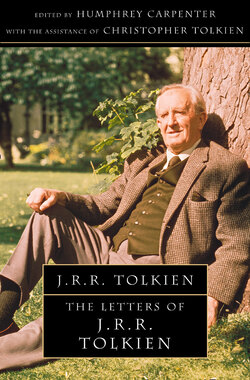Читать книгу The Letters of J. R. R. Tolkien - Christopher Tolkien - Страница 52
46 From a draft to R. W. Chapman
Оглавление26 November 1941
[George S. Gordon, who died early in 1942, was Tolkien’s head of department at Leeds University in the early 1920s, before becoming Professor of English Literature at Oxford and then President of Magdalen College. This draft appears to have been written in reply to a request from Chapman, the Secretary to the Delegates of the Oxford University Press, for reminiscences of Gordon, perhaps to be incorporated into an obituary; Gordon was already known to be terminally ill at the time the letter was written.]
I do not remember dates. Perhaps you know these? I put down some impressions, from which your skill may select a few notes or phrases that may seem appropriate. I associate Leeds with Gordon, although as a matter of fact of my six years there (1920–1925 and one year as a pluralist)1 the larger part was spent in the company of Abercrombie.2
I remember that (before the last war) Gordon’s departure from Oxford3 was viewed with some consternation among the undergraduates of the English School in Oxford; but as a stiff-necked young philologist I did not myself regard the event as important. I first met Gordon at the interview in Leeds (June 1920) for the ‘Readership’ in English Language: established after the death by drowning of Moorman.4 I suppose the title (novel in Leeds), and the high salary (as such things go)5 were both due to Gordon and his farsighted policy. I was, I believe, only a substitute for Sisam6 (not the least of whose kindnesses was his pointing out the chance to me). But Gordon’s kindness and encouragement began at our first meeting. He rescued me from the barren waiting-room, and took me to his house. I remember we spoke of Raleigh7 on the tram. As (still) a stiff-necked young philologist, I did not in fact think much of Raleigh – he was not, of course, a good lecturer; but some kind spirit prompted me to say that he was ‘Olympian’. It went well; though I only really meant that he reposed gracefully on a lofty pinnacle above my criticism.
I was extraordinarily fortunate. And if I speak so of myself, instead of directly and impersonally of Gordon, it is because my prime feeling and first thoughts of him are always of personal gratitude, of a friend rather than of an academic figure. It is not often in ‘universities’ that a Professor bothers with the domestic difficulties of a new junior in his twenties; but G. did. He found me rooms himself, and let me share his private room at the University. I do not think that my experience was peculiar. He was the very master of men. Anyone who worked under him could see (or at least suspect) that he neglected some sides of his own work: finding, especially, the sort of half-baked ‘research’, and dreary thesis-writing by the serious minded but semi-educated hunters of the M.A., of which there was far too much, an exceeding weariness, from which he sometimes took refuge in flight. Yet he created not a miserable little ‘department’, but a team. A team fired not only with a departmental esprit de corps, determined to put ‘English’ at the head of the Arts departments, but inspired also with a missionary zeal. . . . .
A personal contribution of his was his doctrine of lightheartedness: dangerous, perhaps, in Oxford, necessary in Yorkshire. No Yorkshireman, or woman, was ever in danger of regarding his class in finals as a matter of indifference (even if it did not have a lifelong effect on his salary as a school teacher): the poet might ‘sit in the third and laugh’, but the Yorkshire student would not. But he could be, and was, encouraged to play a little, to look outside the ‘syllabus’, to regard his studies as something larger and more amusing than a subject for an examination. This note Gordon struck and insisted on, and even expressed in print in the little brochure which he had made for the use of his students. There was very little false solemnity, except rarely and that among the students.
As for my side: the foundations were already securely laid for me, and the lines of development marked out. But, subject always to his unobtrusive control, I had a ‘free hand’. Every encouragement was given to development on the mediæval and linguistic side; and a friendly rivalry grew up between two, nearly equal, divisions. Each had its own ‘seminars’; and there were sometimes combined meetings. Quite the happiest and most balanced ‘School’ I have seen. I think it might be called a ‘School’. Gordon found ‘English’ in Leeds a departmental subject (I rather fancy you could not get a degree in it alone) and left it a school of studies (in bud). When he arrived he shared a box of glazed bricks, mainly furnished with hot water pipes, with the Professor of French, as their private room. Mere assistants possibly had a hat-peg somewhere. When he left we had ‘English House’, where every member had a separate room (not to mention a bathroom!) and a common room for students: and with this centre the growing body of students became a cohesive unit, and derived some of the benefits (or distant reflections of them) that we associate with a university rather than a municipal college. It would not have been difficult to build on this foundation. But I fancy that, after he left, the thing just ‘ran on’, and did not fall into hands of the same quality. In any case numbers fell and finances changed. And Vice-Chancellors. Sir Michael Sadler I imagine was a helpful superior; and he left about the same time.
